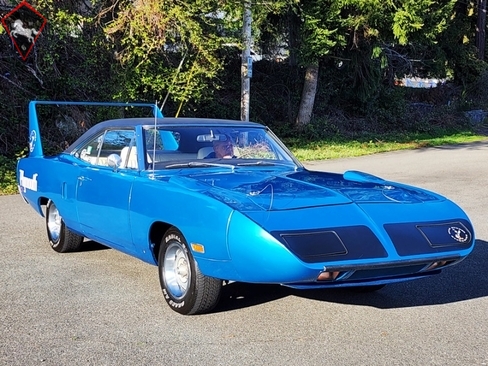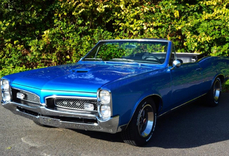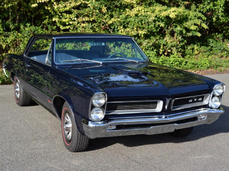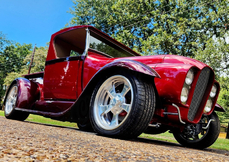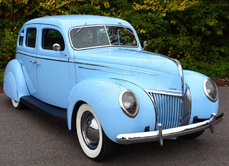Plymouth Superbird 426 Hemi 1970
General description :
1970 Plymouth Superbird 1970 Plymouth Superbird Original 426 HEMI car! One of 136 VIN RM23ROA181256 Own a true American legend The Superbird is an American automotive legend. The high-speed tracks known as Superspeedways became dominated by the highly modified super cars easily spotted by a nose cone, tall rear wing, vents along the top of the front fenders, a pinned hood and stainless-steel-A-pillar covers. All cars were also fitted with a black, boar-grain vinyl roof regardless of paint color. At high speeds the flush rear window eliminates the sail panels. These including the Charger Daytona's were the first American car ever designed in a wind tunnel. This led to the first car to break the 200-mph speed barrier in NASCAR competition. Richard Petty won eight races in 1970 from within the Superbird. The Superbird legend only 1,920 examples were built. In total, only 136 production Superbirds came equipped with the 426 Hemi "elephant motor" making it the rarest of the engine options with a heavy-duty four-speed manual. The 426 Hemi V-8 big block's with two Carter AFB carburetors and is said to have produced 425 (or some say 433) horsepower and 490 pound-feet of torque in dyno testing. The 0-to-60 time of 4.8 seconds. This is not a numbers matching, but is the correct date code 426 Hemi. The 426 Hemi was built 20 over stock compression, Direct Connection pistons along with stylite valves and seats for unleaded gas. The overhauled 426 has just under 10,000 miles. The Superbird is running an 833 4-speed manual overdrive transmission, but the 18-spline trans comes with car. The overdrive trans makes it much more fun to drive. A 5-core radiator that looks and appears stock greatly helps keep it cool. The '70 Superbird is a 2nd owner car since 1982. The full history from day one is available upon request. This was a Chrysler Executive car out of Texas, and in 1971 became available through the Race Drivers Program. The Numbers In 2010 the Superbird was restored with new sheet metal from the doors back, trunk floor, wheel housings, rear panel, rear quarter panels. A complete prime to paint in Blue Metallic (B5). New interior carpet including sound deadener, seat covers front and rear, headliner, vinyl top and a very rare "Clear" front windshield. The front clip is an all sheetmetal nose cone. The dash is all original except for a new main body wiring harness. The tires have been upgraded to radial tires. Interior has the sporty front buckets, the classic 3-spoke sport wood steering wheel and Hurst Pistol Grip shifter. The finishing touches to the car include a Superbird decal on the wing's vertical struts, driver's side headlight cover, steering wheel insert, and door panels, which feature a picture of the Warner Brothers Roadrunner cartoon character holding a racing helmet. The final detail is a "beep-beep" horn. The 1970 Plymouth Superbird, is an icon of engineering, and technology. The car represents a golden era of NASCAR racing. Today the Superbird is an ultra-rare vehicle with rising values a true collector car investment. You truly stand out by virtue of the Superbird's aggressive and outrageous styling. The '70 Superbird is unmistakable and unforgettable vintage muscle car icon of American history rooted firmly in the world of NASCAR racing. Add this investor level Mopar to your collection for $525,000.00! This vehicle is located in Edmonds, Washington.
1970 Plymouth Superbird 426 Hemi is listed for sale on ClassicDigest in Arlington by Cris & Sherry Lofgren for $525000.
Car Facts
Car type : Car Make : Plymouth Model : Superbird Model Version : 426 Hemi Engine size : 0.0 Model Year : 1970 Location : Arlington Vehicle Registration : Undefined
525000 $
Other cars listed for sale by this dealer
About Plymouth
The Plymouth brand had a significant impact on the automotive industry from its inception to its eventual discontinuation. Here is an overview of Plymouth, covering its history, notable models, and specifications:Early Years and Foundation:
Origins (1928): Plymouth was introduced by Chrysler Corporation as an affordable mid-level brand, targeting budget-conscious consumers.
Success Factors: It gained popularity due to its dependable engineering, affordability, and clever marketing campaigns.
Notable Models:
Plymouth Road Runner (1968-1980):
Iconic Muscle Car: Known for its performance, affordability, and minimalist design.
Specifications: Offered various V8 engine options with power ranging from 335 to 390+ horsepower.
Plymouth Barracuda (1964-1974):
Muscle Car Competitor: Positioned as a sporty competitor in the muscle car segment.
Specs: Engine options included V8s with power output varying between 145 to 425+ horsepower.
Plymouth Fury (1955-1978):
Longevity: One of Plymouth's longest-produced models, available in various body styles.
Technical Features: Engine options included V8s with power ranging from 215 to 375+ horsepower.
Plymouth Valiant (1960-1976):
Compact Car: Introduced as a compact car, known for its durability and reliability.
Engine Specifications: Featured inline-six and V8 engines with power ranging from 100 to 235+ horsepower.
Decline and Demise:
Later Years: Plymouth faced challenges due to brand dilution within Chrysler Corporation and increasing competition from other brands.
Discontinuation: The brand struggled in the 1990s amid corporate restructuring and declining sales. Plymouth ceased production in 2001 as part of DaimlerChrysler's streamlining efforts.
Legacy and Impact:
Plymouth's legacy lies in its contributions to the American automotive landscape, offering reliable, affordable, and stylish vehicles. While it faced challenges in its later years and ultimately ceased production, several of its iconic models, especially those in the muscle car era, remain celebrated among collectors and enthusiasts, leaving an enduring mark on automotive history.
